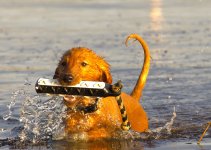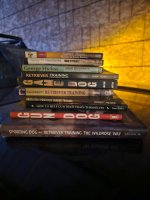There are several different ways to do it... the main thing is consistency, and only one program. Do not mix and match. When retrieving, less is more while training. I throw a few bumpers every day a couple times a day. Takes very little time. Seriously like 2 or 3 bumpers a session. Maybe 5 in a row at max. Always lots of praise when pup brings back bumper. I messed up and would only praise my last pup (had not trained one in 15 years) when she would bring the bumper back to and sit at my side. Turns out she will not retrieve bumpers at all. Only lost one bird this season so she is good in the field, but not worth a darn in the yard. The next dog I trained, I praised lots after each retrieve and then introduced the sit and hold at my side and not dropping the bird till commanded (force fetch). I did not have to properly "force fetch" that dog but he will not drop a bird and will not hold a bumper. In my mind, it does not bother me as I am not after ribbons and awards. I am after enjoyment 365 days a year from my dog. It just gets to be really enjoyable for about 90-100 days in the fall each year. As far as upland specific hunting there is no better training for upland hunting, than going upland hunting. I would have told you 2 years ago my golden was a pet that I took hunting, Last season it was Thanksgiving weekend a light went off and she started to look like a hunting dog I had for a pet. Final weekend of season last year she pointed 2 birds. This year she has pointed double digit birds for me and flushed 116 birds including hens. Retrieving 43 out of 44 chances.
I have tried to do everything to the T, in a couple different books/ dvds. I will say they all are good and all hold merit, but the number 1 thing I have found is time spent in the field and solid obedience training. The rest will come natural to the dog. Once the dog gets a good whiff of bird, and mouth full of feathers its natural instincts will kick in! My golden is good, the only weakness she has in my eyes is she gets a little locked in on one scent. I know I have walked by birds because she is the trail of a runner and won't leave it. If she would quarter better we would have more success... But she is obedient and I can stop her from running out of range. That is 100% obedience and must be solid.
For waterfowl, a dog that is steady is great. A dog that is quiet is great, a dog that is steady and quiet is a unicorn! Any dog that is obedient and upland hunts will fetch ducks. I have never seen a dog that was what I would consider great at both... But know of many, many, many dogs that are more than biddable at both. It is all about your expectations and what will make you happy. I am very pleased when I don't have to get out of the blind to pick up a bird. There are a bunch of guys that are not happy unless the dog goes straight to the bird, straight back to them, stop 3 times to pose for a picture to post on social media, and will hold a 12 pound goose at heel till next Thurday. I have hunted with lots of dogs... my favorite one would jump from the boat as soon as the ducks hit the water, steal your sandwich on the way out, and if you walked out of the house with a gun in your hand he would lay across the driveway and not let you leave unless you loaded him up or ran him over. He was obedient, and was hunted over a lot.


